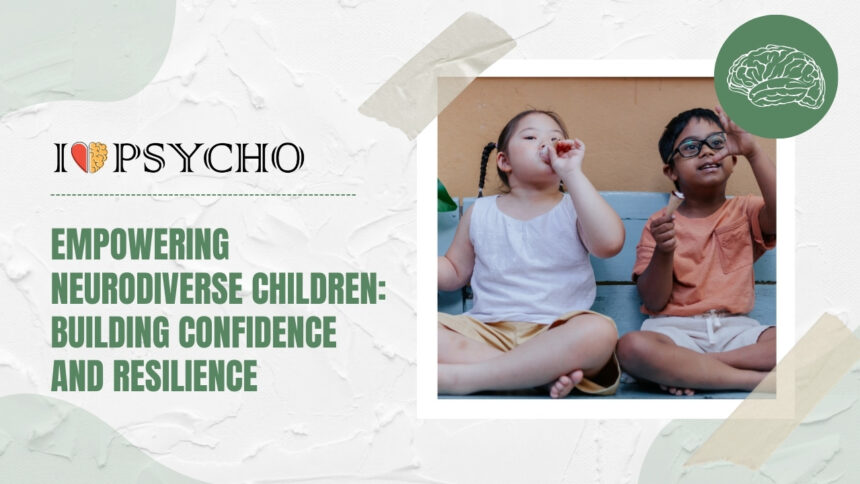Introduction to Neurodiversity
Welcome to a world where differences are not just accepted but celebrated – the world of neurodiversity. Neurodiversity is all about recognizing and embracing the unique strengths and perspectives of individuals with conditions like autism, ADHD, dyslexia, and more. In this blog post, we will explore how we can empower neurodiverse children by nurturing their confidence and resilience. Let’s dive in and discover ways to support these amazing kids on their journey to success!
The Importance of Building Confidence and Resilience in Neurodiverse Children
Neurodiversity celebrates the unique way our brains function, emphasizing differences rather than deficits. For neurodiverse children, building confidence and resilience is crucial for navigating a world that may not always understand or accommodate their needs. Confidence allows them to embrace their strengths and abilities, while resilience helps them bounce back from challenges they may encounter.
By fostering confidence in neurodiverse children, we empower them to believe in themselves and their capabilities. This belief serves as a strong foundation for facing obstacles with determination and courage. Resilience, on the other hand, teaches them to adapt to change, handle stress, and persevere in the face of adversity.
When we prioritize building confidence and resilience in neurodiverse children, we equip them with essential life skills that will serve them well into adulthood. It creates a supportive environment where they feel valued and accepted for who they are – unique individuals with incredible potential.
Tips for Promoting Resilience in Neurodiverse Children
When it comes to promoting resilience in neurodiverse children, there are several effective strategies that can make a significant difference in their development. One tip is to create a safe and supportive environment where they feel accepted and valued for who they are.
Encouraging self-expression through various forms of creativity such as art, music, or storytelling can also help them build confidence and cope with challenges. Setting realistic goals tailored to their individual strengths and abilities is another key aspect of fostering resilience.
Teaching problem-solving skills and positive coping mechanisms can empower neurodiverse children to navigate obstacles with greater ease. Additionally, providing opportunities for social interaction and peer support can enhance their sense of belonging and connection.
By incorporating these tips into daily interactions and activities, parents and educators can play a crucial role in nurturing the resilience of neurodiverse children.
Common Challenges Faced by Neurodiverse Children
Neurodiverse children often face unique challenges that can impact their daily lives. One common difficulty is sensory processing issues, where stimuli like sounds or textures may be overwhelming. This can lead to sensory meltdowns and difficulties in regulating emotions.
Communication barriers are another challenge neurodiverse children may encounter, affecting both verbal and non-verbal communication skills. Some children may struggle with social interactions, making it hard to build relationships with peers. Executive functioning issues, such as organizing tasks and managing time, can also pose challenges in school and at home.
Moreover, neurodiverse children may experience heightened anxiety levels due to the demands of navigating a world not always designed for their needs. Coping with change and transitions can be particularly challenging for them. Understanding these common obstacles is crucial in providing effective support and creating an inclusive environment for neurodiverse children to thrive.
Strategies for Empowering Neurodiverse Children
Empowering neurodiverse children involves implementing strategies that cater to their individual needs and strengths. One effective approach is providing a supportive environment where they feel safe to express themselves without judgment. Encouraging self-discovery through activities that align with their interests can boost their confidence and sense of identity.
Another strategy is fostering open communication and actively listening to their thoughts and feelings. By validating their experiences, you help them build trust in themselves and others around them. Setting realistic goals together promotes a sense of accomplishment and teaches the value of perseverance.
Using visual aids, social stories, or technology can enhance learning experiences for neurodiverse children. Tailoring instructions to suit their preferred learning styles ensures they grasp concepts effectively. Implementing routines and predictability offers structure, creating a sense of security in an otherwise unpredictable world.
By embracing diverse strategies tailored to individual needs, we empower neurodiverse children on their journey towards resilience and self-acceptance.
How Parents and Teachers Can Support the Growth of Confidence and Resilience
Parents and teachers play a crucial role in nurturing the confidence and resilience of neurodiverse children. It is important for them to create a supportive and inclusive environment where these children feel accepted and valued.
Listening actively to their concerns, fears, and aspirations can help in building trust and strengthening their sense of self-worth. Encouraging them to express themselves freely without fear of judgment fosters a positive mindset.
Setting realistic goals tailored to the child’s abilities promotes a sense of achievement while also teaching them valuable problem-solving skills. Providing consistent praise and recognition for even small accomplishments boosts their self-esteem.
Collaboration between parents, teachers, therapists, and other professionals ensures that the child receives comprehensive support across all areas of development. Working together as a team creates a unified approach focused on the well-being of the child.
By fostering open communication, offering guidance when needed, celebrating progress no matter how small it may seem, parents and teachers can empower neurodiverse children to navigate challenges with confidence and resilience.
Resources for Neurodiverse Children and Their Families
When it comes to supporting neurodiverse children and their families, having access to resources can make a significant difference in their journey. There are various organizations, websites, and community centers that offer valuable information and support tailored to the needs of neurodiverse individuals.
One great resource is online forums where parents can connect with others facing similar challenges. These platforms provide a sense of community and allow for sharing experiences, tips, and advice.
Additionally, many non-profit organizations specialize in providing services such as therapy programs, educational workshops, and advocacy support for neurodiverse children. These resources play a crucial role in helping families navigate through the complexities of raising a neurodiverse child.
In addition to online resources, local support groups often host events like social gatherings or informational sessions that can be beneficial for both children and their families. Engaging in these activities can foster connections and create a supportive network within the community.
Having access to diverse resources is essential in empowering neurodiverse children and ensuring that they receive the necessary support to thrive.
Conclusion: Embracing Diversity and Celebrating Differences
Embracing diversity and celebrating differences in neurodiverse children is essential for creating a more inclusive and supportive environment. By building confidence and resilience, we empower these children to navigate through life’s challenges with strength and determination. As parents, teachers, caregivers, and society as a whole, it is our responsibility to provide the necessary support and resources to help neurodiverse children thrive.
Let us continue to advocate for understanding, acceptance, and equal opportunities for all children regardless of their unique abilities. Together, we can create a world where every child feels valued, respected, and empowered to reach their full potential. Embracing neurodiversity not only enriches the lives of individuals but also benefits society as a whole by promoting inclusivity and fostering innovation.
In this journey towards empowerment and inclusion, let us stand together in solidarity with neurodiverse children – celebrating their strengths, supporting their growth, and championing their right to shine bright in a diverse world.









